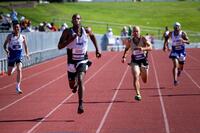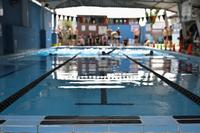Many military basic training or selection programs ban the use of supplements, largely due to misuse.
Pre-workout supplements typically are loaded with higher-than-normal amounts of caffeine, B vitamins, amino acids, creatine and nitric oxide precursors, and some studies have shown them to be beneficial in improving strength performance.
However, the muscle stamina, longer endurance and daily workload requirements of military training and fitness testing aren’t a good environment for tactical athletes to be hyped up on any stimulants.
Some supplements can contain as much as 500mg of caffeine per serving when a cup of coffee usually contains 80-100mg of caffeine per 8-ounce cup. Much of the confusion comes from medical studies that prove these supplements provide humans with more strength, faster recovery, less illness, improved cognitive function and mental focus.
But those studies take place in a controlled setting. Though these products may produce performance improvements, they also usually come with a negative cost, depending on the dosage and the user.
Energy systems and heart rate
Why get your heart rate artificially elevated when you know the events you are about to do naturally will elevate it? This is especially true of events like timed runs, swims, fast rucks and high-rep calisthenics where you must score in the competitive range to pass.
Understanding the energy systems you want to use and how heart rate affects them is something to consider in your performance and how to fuel for each. For instance, if a 1.5-mile run elevates your heart rate roughly 50 beats per minute and you go into the run at 90-100 bpm, you will be in the 150-160 bpm zone. However, if your heart rate is elevated going in at the 120-130 bpm range, the effort of running will put you into or over your max heart rate (MHR) depending on your age and effort. (Theoretical MHR = 220 - age).
Your ability to maintain your set training goal pace is limited in this case, and it will be more difficult to hit your pace without pushing your max efforts (which is a very limited fuel source). I recommend no caffeine before these types of timed running or swimming events.
The Mayo Clinic recommends a high-dose limit of 400mg of caffeine per day for most healthy adults. For most brewed coffees, that is 4-5 cups a day. Or you can just drink as little as two energy drinks. Depending on the person, less than that amount can still cause migraines, insomnia, nervousness, jitters, digestive issues or increased heart rate and blood pressure. If you are taking prescription or over-the-counter medications, this combination with caffeine can even cause heart attack, stroke or seizures.
Digestive issues
One of my biggest recommendations is not to change anything on testing day from your normal training-day routine. The last thing you want to do is try out a new supplement, new food or drink 20-30 minutes before a fitness test.
Find foods and drinks that work well with your normal workouts and practice tests on your own. Game day is not the day to try something new in your nutrition preparation. You could cause gastrointestinal issues that can be quite unpleasant or experience a niacin flush (caused by too much vitamin B3), which is relatively harmless but unpleasant.
That goes for foods as well. Eat what you normally do before your daily workouts. Keep track of good days and bad days in the gym and see what you’ve been eating. Did you sleep poorly, not eat enough or eat the right foods the day before, or did you not drink enough water with electrolytes after the last sweaty workout the day before?
These notes can give you the information you need to go into testing day confident in your knowledge of what works for your digestive system, heart rate and personal best performance.
Water
Some of these products have a one-two punch on the water in your body. Caffeine at high levels in small energy drinks can reduce water and sodium (electrolytes) in the body. More diluted sources of caffeine in iced tea or coffee have smaller effects on water loss.
However, the creatine in many of these drinks can cause muscle cells to retain water, helping with strength and muscle mass. However, sweating and not drinking enough water will make these muscles cramp. You should increase your water intake to higher levels anyway since you are exercising; just add a few more cups to a quart of extra water when taking caffeine and creatine together.
Many people pushing themselves in tough all-day selection programs can become dehydrated quickly, even without these substances. But staying on top of dehydration is critical and more difficult with them. This type of dehydration (with or without these substances) can lead to major muscle group cramping, heat casualties and advance into rhabdomyolysis in tough military and spec ops settings.
Conclusion
Before joining the military and getting involved in sports, supplements can have a place in your fitness program. However, you should have dietary guidance, especially if you are new to them. Also, make sure your protein supplements are pure protein and do not have added ingredients that can affect you adversely during the longer workouts that naturally elevate the heart rate.
Going into these workouts with an already elevated heart rate, water retention, digestive issues, headaches or blood pressure issues can be very uncomfortable and ruin what could have been a great workout. Though rare, deaths have occurred through the use of highly caffeinated supplements or drinks in young, healthy people.
Once you are in military boot camp, basic training or spec ops selection programs, you cannot use these supplements -- but coffee is readily available. Many of these supplements create a psychological dependence, and some contents in these products (caffeine) are drugs that can cause a physiological addiction.
The best option is to avoid these products. Military members for generations have succeeded without these supplement products, and you can, too.
Eat well, sleep better, hydrate with electrolytes and supplement your diet with natural and healthy snacks (protein, carbs, fat) to get through long days of training. A cup of tea or coffee when needed is fine.
Just remember: More does not mean better.
Stew Smith is a former Navy SEAL and fitness author certified as a Strength and Conditioning Specialist (CSCS) with the National Strength and Conditioning Association. Visit his Fitness eBook store if you’re looking to start a workout program to create a healthy lifestyle. Send your fitness questions to stew@stewsmith.com.
Want to Learn More About Military Life?
Whether you're thinking of joining the military, looking for fitness and basic training tips, or keeping up with military life and benefits, Military.com has you covered. Subscribe to Military.com to have military news, updates and resources delivered directly to your inbox.



















